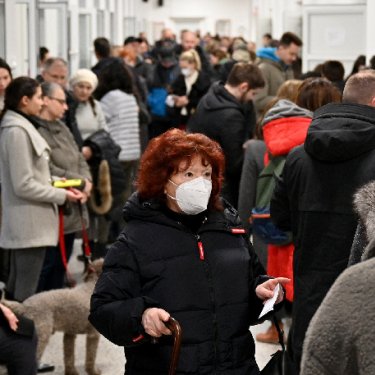Serbia: RSF’s ten recommendations to newly elected officials for strengthening press freedom and trustworthiness of information

On the occasion of the anniversary of the assassination of the journalist Slavko Curuvija, Reporters Without Borders (RSF) urges officials elected in Serbia’s presidential and parliamentary election to demonstrate strong support for the right to information. In particular, the organisation advocates proactive policy in favour of press freedom, a judicial system that protects journalists, and a legislative and regulatory framework that guarantees media independence.
While today, 11 April, marks 23 years since the assassination of the investigative journalist Slavko Curuvija, the perpetrators are still not convicted. The four accused, one of whom is on the run, will soon be tried on appeal. Emblematic of the impunity of crimes committed against journalists in Serbia, the case of Slavko Curuvija also embodies the threats that his colleagues still face, as he did before his assassination: accusations of being a public enemy, smear campaigns, surveillance and attacks. Moreover, as in 1999, independent media have to compete with outlets that spread propaganda, most recently on the war in Ukraine.
The presidential and legislative elections - which took place on 3 April in this tense context - could be the occasion to breathe new life into the defence of reliable and quality journalism. While the results of the elections are not yet confirmed, RSF is submitting ten specific recommendations of a political, judicial and regulatory nature - prepared in cooperation with Serbian experts - for public debate and for implementation by the future president, prime minister and members of the Parliament.
“The war in Ukraine has reminded both Serbia and the rest of Europe of the vital importance of reliable news and information for our safety,” said Pavol Szalai, the head of RSF’s EU and Balkans desk. As for the assassination of Slavko Curuvija, it is a memento of the threats and impunity faced by those who picked up the torch of his journalistic professionalism and independence.”
“We ask officials elected in Serbia’s presidential and parliamentary election to rise to this historic challenge and to adopt strong proactive policies with regard to the right to information and press freedom. If politicians take ownership of our recommendations, they will strengthen both the prospects of Serbia’s application to join the European Union, and the European project’s ability to withstand global threats.”
RSF’s ten proposals for officials elected in Serbia’s election
A. Active political defence of press freedom and the right to information
1. Systematically and publicly condemn smear attempts and verbal attacks, especially when perpetrated by politicians, including members of their own parties.
2. Demonstrate zero tolerance for politicians who attack the media. This includes suspending them or making them resign from important positions.
3. Respond to all questions and requests for information from the media in an equitable manner. This will contribute to pluralistic, honest and balanced media coverage.
4. Propose legislation that extends access to state-held information (Freedom of Information Act) and protects journalists against gag suits (Strategic Lawsuits Against Public Participation, SLAPPs).
B. A judicial system that protects journalists
5. Ensure that prosecutors are given binding instructions to take urgent action in cases of violence against journalists and media, and ensure that they carry out these instructions promptly and regularly.
6. Allocate adequate financial and human resources to the commission tasked with investigating the murders of journalists Slavko Curuvija, Radislava Dada Vujasinovic and Milan Pantic, and provide the commission with unrestricted access to state documentation, in order to solve these cases and bring them to justice.
7. Ensure that the commission’s investigations into these killings lead to effective legal proceedings (indictments) by the prosecutor’s office.
C. A regulatory framework that promotes media independence
8. Ensure that the Electronic Media Regulator (REM) is impartial and effective, especially by:
- reducing the proportion of REM Council members who are appointed by political bodies;
- making the REM's decision-making more transparent, in particular by enhancing public availability of its decisions on its website, and making its meetings open to the public via live streaming;
- giving the REM the power to suspend licences and allowing a public debate on a proposal to extend the REM’s powers so that it can fine media outlets.
9. Allocate government grants to the media equitably by ensuring that:
- the jury members who select the recipients of government grants are qualified;
- grants are allocated only to media that respect the Journalists’ Code of Ethics, that the Press Council is involved in the decision-making process, and that it takes account of a European standard of professional journalistic procedures, such as the Journalism Trust Initiative launched by RSF;
- the jury’s decision-making process is transparent, in particular its selection criteria, and that reports of the jury’s decisions are published regularly.
10. Allocate national broadcast frequencies in a manner that is transparent and free of political influence and only to media that respect the Journalists’ Code of Ethics.
Serbia is ranked 93rd out of 180 countries in RSF's 2021 World Press Freedom Index.



